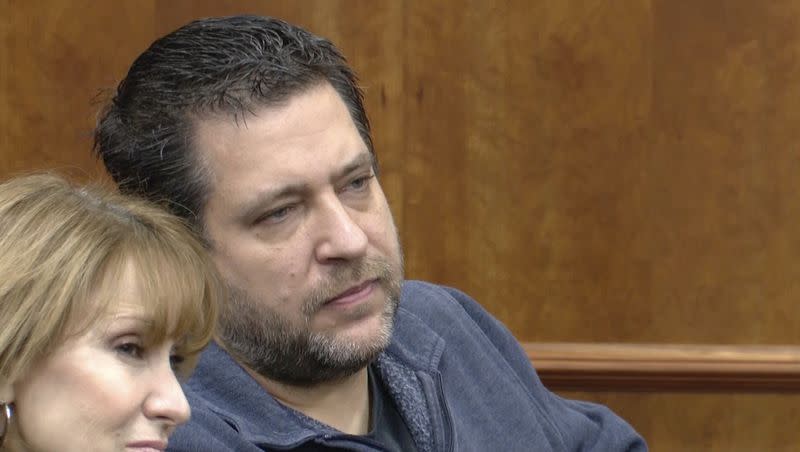A pastor tried to house the homeless. He ended up in court

This article was first published in the State of Faith newsletter. Sign up to receive the newsletter in your inbox each Monday night.
As communities across the country struggle with ice, snow and below-zero temperatures, a pastor in Ohio is defending his efforts to keep his neighbors warm.
The Rev. Chris Avell, who leads a church called Dad’s Place in Bryan, Ohio, is already facing 18 zoning charges related to allowing members of the homeless community to sleep in his church building, and more charges could be on the way.
“While conducting a follow-up inspection ... the fire chief discovered a potentially dangerous gas leak as well as violations that had not been corrected,” according to WTVG, a news station based in Toledo.
The original charges stemmed from the Rev. Avell’s decision to keep his church open 24/7 last year and provide space for people who couldn’t get a spot at a nearby homeless shelter.
This ministry violated the city’s zoning code, which prohibits buildings downtown from using first-floor spaces for residential purposes.
After a letter about the zoning violations failed to force changes, city officials showed up at Dad’s Place on New Year’s Eve to notify the Rev. Avell of the formal charges he is facing, according to the pastor’s attorneys from First Liberty Institute, which specializes in religious freedom cases.
The attorneys argue that the city is inappropriately “going after” the Rev. Avell, who they say is simply trying to put his religious beliefs into action.
“The city would rather kick these folks to the curb in the cold outdoor months of December and early January than allow the church to remain open 24/7 to those who need it the most,” said attorney Jeremy Dys in an interview with Fox News. “It’s unconscionable. We’re going to hold them accountable.”
The Rev. Avell’s case is in the national spotlight, and many observers seem to sympathize with and support what he’s trying to do. I’ve seen several tweets and columns about it from people who are normally skeptical of religious liberty claims; the posts are generally critical of the city’s actions.
“Avell saw a problem. He said he addressed the issue by helping 100 people and is now facing criminal charges. Does this sound right to anyone?” wrote Milwaukee Journal Sentinel columnist James E. Causey.
For their part, city officials say that their actions stem from a desire to keep members of the community, including homeless men and women, safe.
“While the city has been addressing these issues, it has been accused of failing to support the homeless. Nothing could be further from the truth,” the city said in a statement about the church’s safety issues, including the recently discovered gas leak.
The statement noted that Dad’s Place is free to find another space in the city that’s zoned appropriately and use it to run a homeless shelter.
The conflict in Ohio calls to mind other recent religious freedom cases involving at-times controversial acts of service, including efforts to offer water bottles to migrants entering the United States illegally. As the Rev. Avell has, the people involved in these cases often receive lots of positive attention in the press and on social media, but this positive attention doesn’t always translate to a legal victory.
The Rev. Avell’s case is still far from a resolution. Earlier this month, he pleaded not guilty to the 18 original zoning charges. On Monday, he filed a lawsuit against the city, alleging that officials’ actions violated constitutional religious freedom protections, among other laws.
Fresh off the press
What Jim Harbaugh said at the March for Life
A contestant on ‘The Bachelor’ is facing criticism for her ties to Trump. Is it fair?
The Supreme Court battle conservatives have been waiting for
Gen Z is skeptical of religious institutions, but supports people of faith, survey shows
The star of ‘Reacher’ has a message for Christians
Person of the week: Paolo Benanti
Franciscan Friar Paolo Benanti, like many Catholic priests, spends much of his time studying religious texts, worshipping God and teaching others. But unlike his colleagues, he also consults with Silicon Valley leaders about artificial intelligence and takes part in international gatherings on the topic.
The Associated Press recently wrote about Benanti’s unique work and why it’s so valuable to Pope Francis.
“With a background in engineering, a doctorate in moral theology and a passion for what he calls the ‘ethics of technology,’ the 50-year-old Italian priest is on an urgent mission that he shares with Francis, who, in his annual peace message for 2024, pushed for an international treaty to ensure the ethical use of AI technology,” the article said.
What I’m reading...
Scholar and pastor Sherry Molock is on a mission to decrease suicides among young Black people, in part by training church leaders to care for their needs. Vox recently wrote about her efforts, including the unexpected pushback she’s faced. “People talk about biblical abominations. That is the abomination for me: when we know kids are suffering and we’re not willing to do what it takes to change the world so they don’t have to,” Molock said.
Thanks to an ancient piece of papyrus, we now know more about how early Christians related to Jesus. Daniel Silliman wrote about the discovery for Christianity Today.
After following Bobby Ross Jr.’s trip to the South Pacific on Facebook, I had to check out the article that resulted from the adventure. He wrote for The Christian Chronicle about students in Australia spending two weeks on a developing island nation to disconnect from their smartphones and connect with their faith.
Don’t miss my friend Julie Zauzmer’s beautiful reflection for The Washington Post on what she’s learned in the year since her son died.
Odds and ends
My story about the Becket Fund’s new survey on religious freedom barely scratched the surface of the data available in the full report.

